SIXTH FORM PROSPECTUS 2025/26

ACADEMIC ACHIEVEMENT AND PERSONAL DEVELOPMENT
RATED ‘EXCELLENT’ (ISI, DECEMBER 2021)


ACADEMIC ACHIEVEMENT AND PERSONAL DEVELOPMENT
RATED ‘EXCELLENT’ (ISI, DECEMBER 2021)
It is a great pleasure to welcome you to our 2025/26 Sixth Form prospectus. Our Sixth Form is a thriving, vibrant and energetic community where students make the transition from school life to the world of higher education, work and a remarkably broad range of further destinations. We aim to nurture ambitious learners who shape their worlds with their compassionate, creative and questioning minds.

What makes Sibford Sixth Form different to other Sixth Forms and colleges? Fundamentally, you will be known and valued as part of our community – whatever your particular strengths might be. We believe in the importance of young people having a voice and taking responsibility to make a difference to the world around them. Each pupil is of exceptional importance to the teachers, tutors and Sixth Form team, all of whom work together to create an optimal educational environment. The Sixth Form years lay important foundations for future success throughout life and pupils have more autonomy than ever before in their choices; at Sibford they are fully supported at all times by dedicated staff.
Academic results are very important indeed - we are very proud to have a rich history of being ranked in the top group
One of our great strengths is the breadth of students that you will meet within the community
of schools for pupil progress for A Level, including pupils who go on to achieve a suite of top grades – but this is not the sole goal of education. We aim to give a platform to our students which is not stuffy or pretentious but where individuals are encouraged to be authentic and values truly matter. So we will support you in your aspirations, we will guide you when times are tough (and there will inevitably be tougher times) and we will celebrate with you in your success.
Our Sixth Form Centre is a warm, happy and vibrant part of the wider school community. Walking through the doors you are immediately greeted by the common room and the kitchen / diner. Sociable and welcoming, there is perhaps more of a ‘university education’ feel to this part of the building. Students have considerable autonomy and are expected to ‘get the balance right’ between work and play.
Leadership and personal responsibility are very important to us. Our Sixth Form leadership team play a key role in leading the life of the school. However, leadership opportunities are myriad and Sixth Form students are quick to find ways to make their voices heard and their actions count.
The shape and structure of our Sixth Form community means that students are well-known and they receive personalised guidance and direction. One of our great strengths is the breadth of students that you will meet within the community and to this end we have students who are taking courses to many diverse destinations.
You might be following a purely academic route, and we celebrate those students who are looking to join some of the very best universities in the world. At the same time
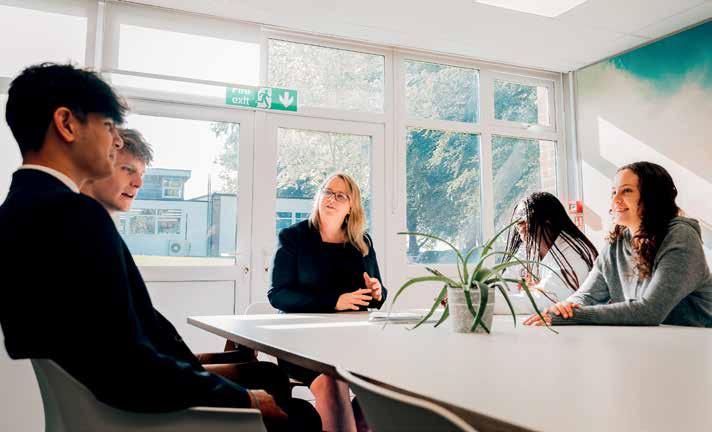
however, we take pride in those students who wish to follow a more vocational path or combination between more traditional A Levels and BTEC courses that can lead into an apprenticeship, straight into work or maybe into a gap year.
We also have a well-established international element to our Sixth Form, including our Dresden Scholars, and this brings its own cultural diversity and a global element to our community. This diversity in our Sixth Form is a great preparation for the ‘real world’ which awaits at the end of post-16 study.
The curriculum in our Sixth Form is truly holistic. So whilst you may wish to take the three sciences and Mathematics, or another ‘traditional’ route, we are also able to offer a great breadth of choice to those looking to study here. We will work hard to try and get the best combination of subjects for you. Careers advice is very strong, as are study skills and UCAS preparation. You will have an individual tutor and plenty of advice and guidance on hand.
There is a great deal going on for our Sixth Form students. Sport is thriving at Sibford School with students competing at a national and sometimes international level, which sits in tandem with a sport for all mentality. We have particular strengths in swimming, equestrian,
We aim to nurture ambitious learners who shape their worlds with their compassionate, creative and questioning minds
motor sport and traditional sports such as hockey, rugby, cricket, netball and football. We also have the facilities to match within our 50 acre site. Extra-curricular activities and community service are well developed and there are regular lectures and trips organised to enrich daily life. Opportunities to get involved in drama and music are well-established and the likes of The Duke of Edinburgh’s Award (through to Gold level) and adventurous international trips are part of our DNA.
No Head’s message in a booklet can do Sibford justice – a place which flourishes through partnerships and personal interactions. Please do take the time to come and meet us – you are most warmly welcome.
Rebecca Evans Head
Welcome to Sibford Sixth Form: a place where you can develop intellectually, personally and socially.

At Sibford we offer a holistic educational experience. We dovetail our curriculum offer alongside our pastoral support to encourage a thirst for lifelong learning in our students. The fabric of our school is the supportive environment we provide each one of our students. A common theme in everything we do is individuality. Whether it is academic, cultural or sporting success, we pride ourselves in providing the high level of bespoke guidance, structure, advice and experience needed to allow our students to achieve excellent progress.
We are proud of our students, the results they achieve and the citizens they become. In 2024 39% of our results at A Level / BTEC achieved A/A* or equivalent. Our BTEC results also put us in the the top 10% of schools for progress made by our students. We offer a wide ranging post16 curriculum which involves both traditional A Level and vocational subjects. As a Sixth Form team, we constantly review our curriculum offer to accommodate national trends to give our students every chance of success post Sibford. Pastorally, our students are seen as ambassadors to the younger students in the school. We have high expectations of our Sixth Formers. Some of these include the responsibility to take part in community
Pupils make strong contribution to the lives of others, both in school and wider community
(ISI, December 2021)
service, raising awareness and money for a chosen charity of their choice and making the most of leadership or super-curricular opportunities to build on their potential.
We are proud of our dedicated Sixth Form Centre. This is an incredible working space for our students to learn and grow as individuals. The work spaces provide a balance between collaborative working areas combined with individualised work spaces, catering for the individual needs of each of our students. This has been designed in a way that encourages a university style of learning and a seamless transition into professional life beyond Sibford.
We hope that you look at Sibford as an environment that taps into the individuality of a student. It is a place where staff understand the needs and aspirations of each student. This intimate and supportive space is a platform that allows students to be the best they can be in whatever their interests and strengths are and wherever their dreams or aspirations take them.
Head of Sixth Form, Helen Gormley
The Sixth Form Centre at Sibford School is fully equipped for the needs and requirements of young adult learners. It provides comfort and support for a variety of learning styles as well as areas for students to relax in each other’s company.
Effective use of private and independent study is the key to success in the Sixth Form. The designated study areas ensure that Sixth Form students are fully supported and encouraged to work independently.
All students learn in different ways. To ensure that all learning styles are catered for, the Sixth Form Centre provides a range of soft chairs, sofas, tables and study areas to ensure that students can select their preferred method of learning. Students are also provided with café tables so that groups can share and extend their learning together.
Sixth Form students are expected to bring their own devices to school. This ensures students are able to use their independent study time effectively, enabling them to build on and extend the class learning.
Social time is important for full enjoyment of Sixth Form life as it creates positive working relationships and engenders supportive groups. To ensure that all students can make the most of their educational experience, the Sixth Form Centre includes a modern, well equipped kitchen area exclusively for Sixth Form students.


BEN
Studying A Level Maths, Physics and Geography.
Sibford has now made up most of my academic career and has been highly influential in my learning ever since I joined at the start of Year 7. The positive impact Sibford School has had on me extends to more than just my learning and to the person I have turned into over my stint at this school. The experience offered here is a unique and great environment that spurs development; from the small class sizes to the close-knit community, every aspect has benefited me and my peers in our learning. School can be hard to digest for some, especially those with learning difficulties like myself, but here I have prospered and found ways with the help of my teachers to pull me through my subjects and stay afloat. Going through school with Autism and ADHD isn’t easy but here I have been able to achieve just as much as anyone else. I cannot imagine being anywhere else.

Studying A Level Chemistry, Physics, Biology and Maths. Since joining Sibford in Year 5, the school has helped me develop into a confident individual, with the school ethos as a driving factor behind my daily life. At Sibford, everyone is treated as equal, the only differences amongst us being our individuality and responsibilities (a defining part of Sixth Form). I can strongly say this adds a sense of control over one’s learning, empowering and encouraging the will to succeed; of course, with the readily available help from teachers along the way. The staff at Sibford are second to none, they have helped me to extend my learning through all years, even going out of their way to offer advice, opportunities and more recently, aid with my medical school application. My time here has taught me to own my future and be ambitious, I would likely not be where I am today without the experiences I have found throughout Sixth Form and my time here for which I will always be grateful.

NIAMH
Studying A Level Maths, Physics, Chemistry and Further Maths. I joined Sibford in Year 11, and although I was unsure at first about moving schools, the transition was smoother than expected. Coming from a much larger school, I immediately noticed how the smaller, more focused learning environment helped me settle in quickly. What I appreciate most about Sibford is the balance it offers between academics and personal growth. Studying Maths, Physics, Chemistry, and Further Maths has certainly been challenging, but the level of support and encouragement from teachers has made a huge difference in my confidence and ability to succeed. Beyond academics, the school has given me the chance to explore new interests and step outside of my usual routine, which has been incredibly rewarding. The positive and encouraging atmosphere here makes it easy to form strong relationships, and the close-knit community has helped me grow both socially and academically. My time at Sibford has given me not only the academic foundation I need for the future but also the selfassurance and life skills that will benefit me in the years to come. I’m grateful for the opportunities I’ve had here and feel much more prepared for what lies ahead.

Studying A Level Sociology, CTEC Sports and Physical Activity, and Level 3 Food Science and Nutrition.
I joined Sibford in Year 7, and from the moment I arrived, I felt incredibly supported. As someone with dyslexia, I received help right away, which made a huge difference in how I approached learning. With my teachers’ guidance and personalized support, I became more independent and hardworking, growing both academically and personally.
As I progressed through the school, I truly began to come out of my shell. Sibford’s environment encouraged me to build confidence, thanks to the many opportunities available both inside and outside the classroom. Beyond academics, Sibford supported all my passions, from Sport—where I’ve been part of the teams since the beginning—to Drama, where I’ve performed in multiple school productions and made lifelong friendships. The small class sizes and close relationships with my teachers have greatly impacted my learning, especially as I entered Sixth Form. I’ve always felt supported, particularly when starting the university application process. The combination of academic guidance and extra-curricular opportunities has given me the confidence to pursue my goals with certainty.
The PSHE Programme has been designed to reflect the needs of our pupils, to equip pupils with a sound understanding of risk the knowledge and skills necessary to make safe and informed decisions. We seek to use PSHE education to build, where appropriate, on the statutory content already outlined in the national curriculum, the basic school curriculum and in statutory guidance on: drug education, financial education, sex and relationship education (SRE) and the importance of physical activity and diet for a healthy lifestyle.
We follow the core themes stipulated in the Key Stage 5 PSHE framework offered by the PSHE Association.
Our aims are:
• To develop and foster the creation of responsible and caring citizens, promoting equal opportunities and environmental awareness.
• To promote self-esteem and emotional wellbeing, helping the formation and maintenance of positive relationships.
• To prepare pupils for the next steps in their education, training or employment. Students will learn.
• To develop confidence and responsibility and make the most of their abilities.
• To develop a healthy, safer lifestyle.
• To develop good relationships and respect the differences between people.
Key areas in our PSHE programme follow core themes set by the PSHE association.
These include:
1. Health and wellbeing
2. Relationships
3. Living in the wider world
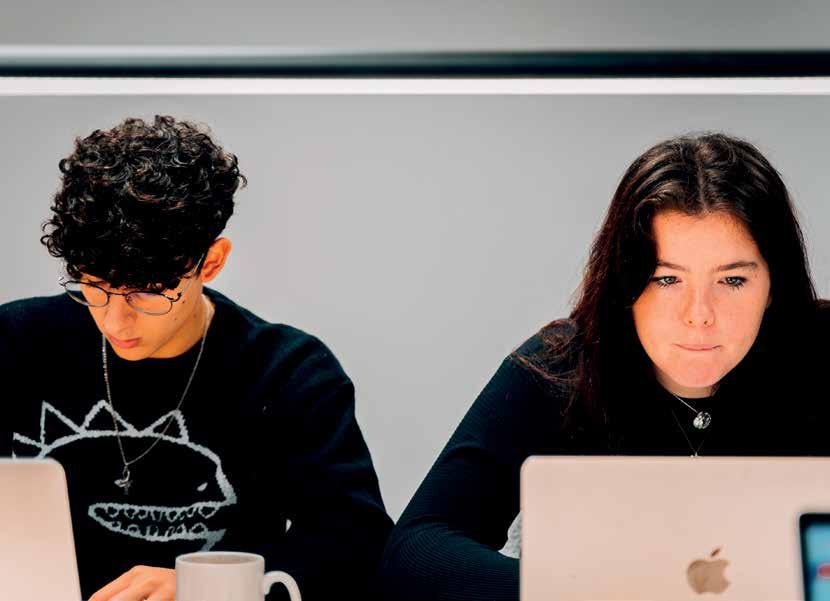
Principals and values are actively promoted which facilitate the personal development of pupils as responsible, tolerant, law-abiding citizens
(ISI, December 2021)
When you join a sports team, a drama club, or a debating society at Sibford School, you are not just learning skills related to that activity. You are also building character, resilience, and perseverance. These are qualities that will serve you well not only in school but throughout your entire life.
Extra-curricular activities challenge you in ways that the classroom alone cannot. Whether it’s training for a match, rehearsing for a play, or preparing for a competition, you learn that success requires sustained effort over time. Extracurricular activities also teach us about teamwork, collaboration, and leadership.
There are countless research studies showing students who are involved in extra-curricular activities fare better on just about every conceivable metric – they earn better grades and have higher self-esteem, but most importantly they have better health and wellbeing.
Please see our selection of activities that Sibford Sixth Form offers each year. The culmination of these events is the Curriculum Enrichment Week trip at the end of Year 12. This is chosen and planned by a team of volunteers from Year 12 alongside staff.
SPORT / PHYSICAL ACTIVITY:
• Strength and conditioning
• Swim academy
• Cricket academy
• Rugby training
• Hockey training
• Netball training
• Football training
• Climbing
MUSIC AND DRAMA:
• School production rehearsals
• Chamber choir
• Sibford community orchestra
• Sixth Form band
• Peripatetic music lessons
• LAMDA lessons
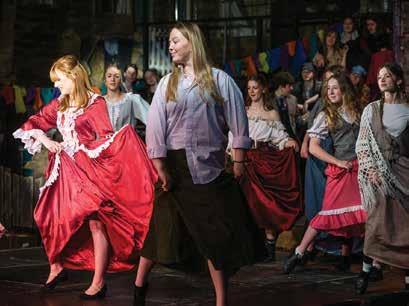
WIDER SOCIETIES
• Fair Trade group
• Amnesty International
• LGBTQ+ society
• Charities council
• Eco council
LEADERSHIP OPPORTUNITIES
• Head team
• House captains
• Sports captains
• Boarding captain
• Charities captain
CREATIVE ARTS:
• Ceramics club
• Printmaking club
• Screen printing club
OTHER:
• Debate club
• Duke of Edinburgh – Silver and Gold
• Cooking on a budget
• Curriculum Enrichment Week – Year 12 residential
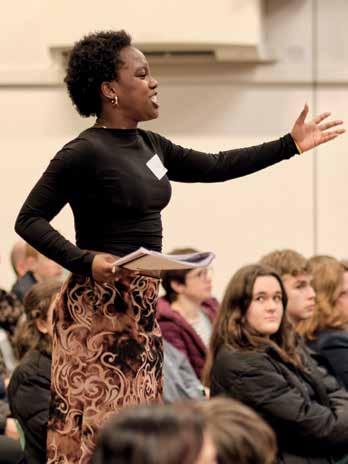
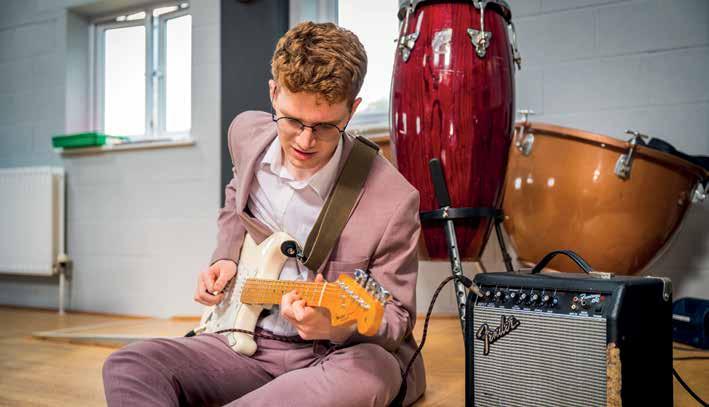
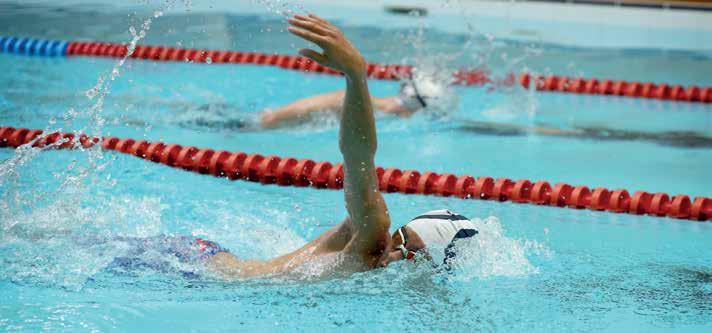
The DofE scheme gives young people the chance to serve their local community and to gain a sense of achievement. Often students will already have completed their Bronze Award, however, it is possible to have direct entry into the award at Gold Level. DofE is a non-curricular activity which is greatly valued by employers and universities.
The aim of these events is to support students in making important decisions about their future. The UCAS application process will be fully explained so that students can make appropriate choices. They will also receive advice on how to make successful applications to universities, apprenticeships and the world of work.
It is an expectation that students engage wholeheartedly in community service. As senior students in the school, we want our students to be a presence and to rub shoulders with younger students. Students can contribute in a variety of ways such as, running a Key Stage 3 club, being a classroom assistant in the junior/senior school or any other way they feel can add value to our community and be in a position to contribute in the service of others.
Each tutor group will be responsible in selecting a charity that they wish to support. Throughout the year, students in the tutor group will be expected to develop a strategy to raise awareness and money for their chosen charity. This offers students the opportunity to organise fundraising events, deliver presentations in front of others, coordinate activities, make decisions and ultimately make a difference in the wider community.
The Sibford Diploma is an opportunity to recognise the extra achievements that our students make at Sixth Form; the wider accomplishments throughout their school journey that do not fit into the standard school curriculum. Over the 2 years there are a wealth of opportunities for students to widen their skill set and deepen their understanding of life beyond school. The World Economic Forum identifies the 3 top employable attributes as analytical thinking, creative thinking and resilience; the Sibford Diploma encourages our students to develop these skills through their time with us.
Each student is encouraged to take steps towards enriching their portfolio in 4 main areas:
• Personal Development
• Leadership
• Community
• Talent
HOW IT WORKS
Presented at the end of Year 12, students will document their activities throughout the year to evidence their achievements and to outline their highlights. This document can be submitted in any form such as Powerpoint, essay or portfolio. All submissions must be entered by the end of May half term to their tutor and Helene Gentry (Pastoral Administrator). Students will be awarded credits for the diploma in the 4 areas outlined above.
Levels for the award are as follows:
In order to qualify for the higher levels, a student must obtain credit in a range of areas as we wish to encourage a varied skill set. School and student led activities are awarded credit once completed. A student will then be awarded a grade according to their overall level of credit and quality of their submission.
Achieve 20 credits across all 4 areas
at least 3 areas
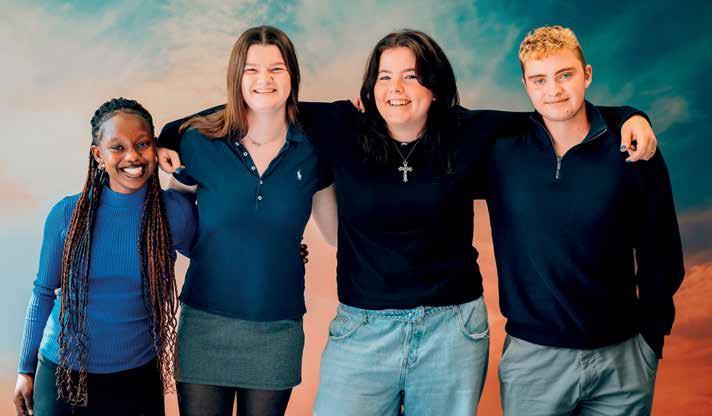
This list is not definitive. If there is something that a student completes that encourages skills beyond the curriculum, this can be included on the submission document and the activity will be considered and credits awarded accordingly.
BENEFITS:
Beyond the ‘soft skills’ that this programme encourages, the Sibford Diploma can be referenced in UCAS and job applications.

As part of our commitment to equipping students with essential life skills, we are excited to offer a unique 8-week programme designed to prepare our students for the realities of university life. Each week, students will participate in a focused session, boarding one night a week to immerse themselves in practical topics that will ease their transition to life away from home.
From financial management to essential life skills, this programme covers a wide range of areas vital to independent living:
Master the art of managing finances as a student, from setting up a budget to making the most of student discounts.
Learn how to create nutritious, budget-friendly meals with limited resources – a key skill for student life.
USING AI POSITIVELY FOR STUDIES
Explore how AI tools can enhance your learning, helping you to research efficiently, organise your notes, and stay on top of assignments.
BASIC DIY & INTERIOR DESIGN FOR STUDENT ACCOMMODATION
Discover simple ways to personalise your space and tackle minor repairs to make student housing feel like home.
CAR MAINTENANCE
Gain hands-on experience in maintaining a vehicle, from checking oil levels to tyre pressure, ensuring you’re road-ready.
BASIC FIRST AID & HEALTH AND WELLBEING
Learn essential first aid skills and tips for maintaining physical and mental well-being while living independently.
CONFIDENCE & PUBLIC SPEAKING
Develop the confidence and communication skills needed for presentations, interviews, and everyday interactions.
HOSTING A DINNER PARTY
Build social skills and learn how to host a memorable, affordable dinner party for friends and flatmates, fostering community spirit.
This programme is an integral part of our Sixth Form offering, providing practical, real-world knowledge that will support our students beyond the classroom. By participating in these sessions, students will gain the confidence and skills to thrive independently and make the most of their university experience.

Sport is as an integral part of Sixth Form life, enabling all pupils to engage in physical activity every week. This provides opportunity for our Sixth Form pupils to stay involved in team sports and physical activities, continuing to develop their social and physical attributes, personal fitness and to support their mental wellbeing. All pupils are involved in the games afternoon and it is viewed as an important part of the Sixth Form experience here at Sibford.
Pupils are encouraged to represent the school at their chosen sports each term and can opt for the following:
• Autumn Term – Rugby and Hockey
• Spring Term – Netball, Football and Rugby 7s
• Summer Term – Cricket
Sports such as swimming, x country and climbing are conducted throughout the academic year rather than focused on a particular term.

A busy and competitive fixture and training schedule is organised by the Sports Department against local and regional opposition. Each Performance Sport is coached by a highly trained team led by our dedicated department. Fixtures are played on a Wednesday afternoon between 2-6pm with pupils expected to commit to a later finish to the school day. Flexi boarding is offered and encouraged on fixture nights to support this.
Our extensive first-class facilities include superbly maintained sports pitches, an indoor swimming pool and a sports complex with a climbing wall. These support us to challenge our top athletes to their potential but also provide opportunity for all to gain enjoyment through participation.
Those pupils who would prefer to not participate in school teams but enjoy being physically active are involved in a carousel of activities throughout the three terms, with the aim of offering important social, physical wellbeing.
The sports development carousel activities change every term and aim to offer variety, if not some targeted activities. The range of activities on offer can be seen opposite and may change depending on interest.

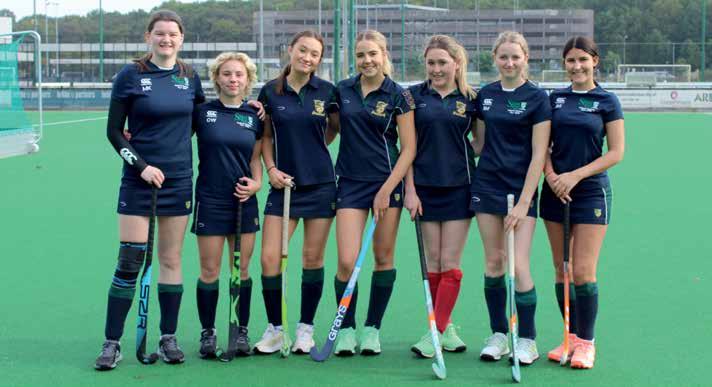
Alongside a busy extra-curricular programme within the school, Performances Sports clubs are available for Sixth Form students. Pupils are encouraged to attend team sports for developing skills further and team training and other clubs for individual and personal fitness development. A range of activities are available for pupils before and after school and include; swimming, strength and conditioning, climbing, rugby, hockey, netball, among others.
Sixth Form students are actively encouraged to develop their leadership skills by assisting the PE department in running many of our lunchtime and after school clubs. As well as being involved in some lessons and younger age group teams. This creates a great opportunity for developing a fantastic community feel throughout the school as well as enabling Sixth Form students to gain valuable life experience which will strengthen any potential university or employment applications.

Careers Education and Guidance begins in Year 7 through to Year 13. This is delivered through in school event days, careers visits, dropdown days and the tutor based PSHE programme. In addition, visiting speakers address assemblies and subject teachers help pupils explore careers related to their subjects. We also provide parent information evenings relating to careers information and support.
UNIFROG:
We use the platform Unifrog, introduced in Year 7, to support, guide and advise students on their choices and options that they make at various points in their Sibford career. Unifrog provides a one stop platform for students to take individual responsibility for their future choices and where they create and record their own portfolio of skills, competencies, and experiences.
Sixth Form students are supported fully and career guidance is offered continuously to all Year 12 and Year 13 students. We focus on personal statement writing, Curriculum Vitae’s, UCAS and post-18 applications. Students are also encouraged to undertake independent research, build their skills set and their personal portfolio to enable them to apply for their preferred post-18 choices. Year 12 students have the opportunity to undertake work experience with a focus on their post-18 choices, and all students attend various visits to Higher Education Information days and National Careers and Apprenticeship Fairs. At the end of Year 12 students are given a 1:1 post-18 careers session to help them navigate all post 18 options. This gives students the summer to research and prepare for Year 13 applications in the following academic year.
All Sixth Form students are expected to use the Unifrog platform to build their independent skills sets. There are continuous webinars offered which students are expected to sign up to. Unifrog also offers a Massive Open Online Courses (MOOC’s) aiding students in developing their personal super-curricular and extra-curricular profiles.
We also strongly encourage parents to access the Unifrog platform to support and help their child on their post-18 options. All parents are sent a Unifrog login allowing access the student side of the platform.
Work experience is expected to be undertaken in Year 12 for all students. Students are expected to organise their own placement. The process is documented at every stage using the Unifrog platform involving all parties to complete the relevant administrative sections and processes to ensure that the placement holds the correct documents and ensuring the placement is safe to go ahead.
This is a fantastic super-curricular opportunity and will unlock crucial employability and transferable skills that will allow students to be competitive and access a variety of post-18 pathways.
The careers lead is available during lunchtime drop-in sessions and any student can make an appointment via email: sread@ sibfordschool.co.uk.
For more on careers please visit the Sibford School Website.
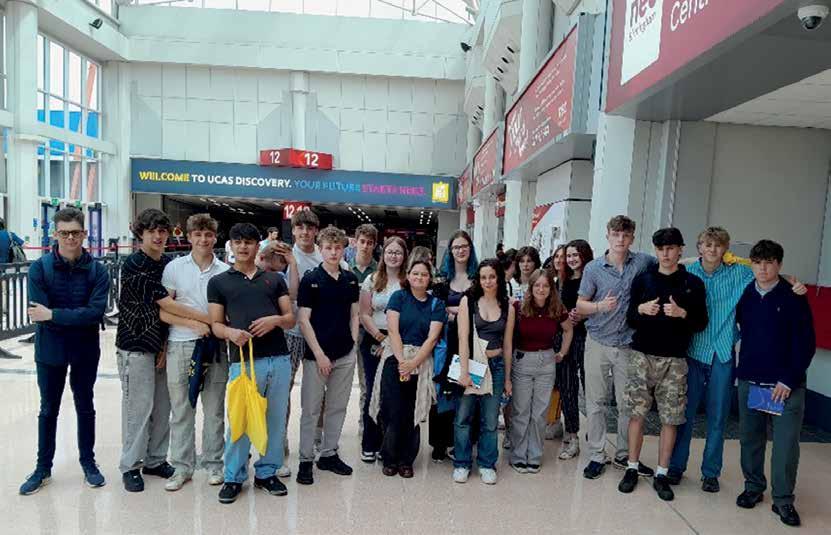
At Sibford, there is a really supportive community of pupils and staff that are always friendly, and available to talk to if you have any questions (Sixth Form Student)
We offer a variety of tuition for Key Stage 5 students. For students that need support, we can offer individual weekly tutorial sessions with a member of the SfL team.
Our aim is to underpin learning and work towards transition to higher education studies. There is a focus on relevance to study, overlearning, motivation and ‘little and often’.
The broad areas considered to create targets are:
• Effective study skills
• Assistive technology
• Time management and organisation
• Reading for research
• Writing: assignments, essays, reports
• Establishing learning priorities
The SfL team will carry out the necessary assessments for access arrangement applications for public examinations.
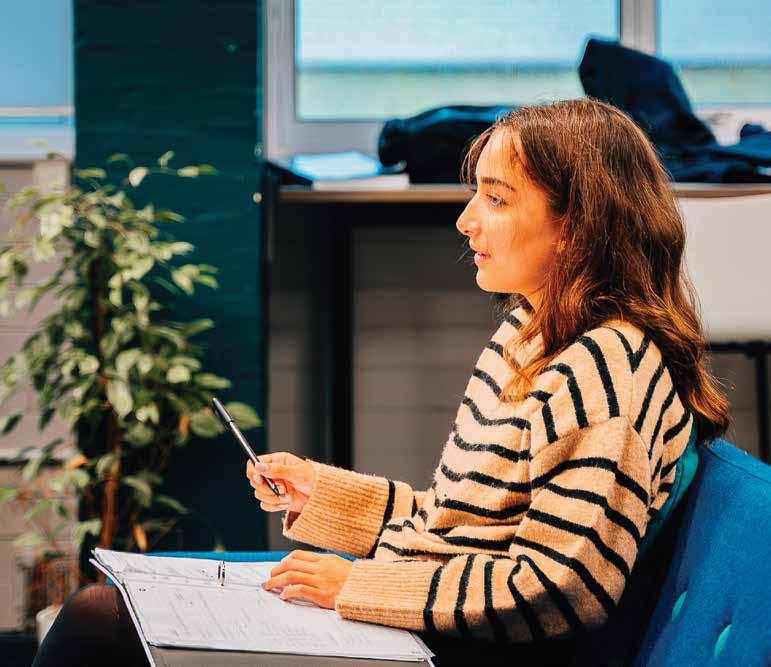
When I first joined Sibford everyone was very welcoming and always willing to help. Kind, friendly students and teachers make it very easy to settle in coming from another school.
(Sixth Form Student)
Boarding at Sibford School is an enriching, positive experience where all are encouraged to live adventurously.
Sibford welcomes both day pupils and boarders. A number of our Sixth Form students choose one of our boarding options because boarding can provide a valuable opportunity to experience independent living in preparation for university or leaving home.
Sixth Form boarders find that the staff support and supervision in the evenings helps them focus on school work, manage distractions and gain the qualifications they are aspiring to achieve.
WHY BOARD AT SIBFORD SCHOOL?
Boarders have the opportunity to take responsibility for assisting in the organisation of extra-curricular activities and trips, and find they are able to develop their self-confidence and leadership skills as senior members of the school community.
Homely feel
Our two boarding houses are staffed by friendly, experienced House Parents that take a genuine interest in the academic and pastoral welfare of the students and work hard to create a family style environment.
Penn House
Penn is our boys boarding house, home to students from Year 7 to Year 13. The house has a large, homely dining area where the students can enjoy meal times together, a games room with a pool table and games consoles, and also a cinema room for watching movies and TV.
Upstairs, the house has a number of shared rooms, some of which contain four beds and some of which include two beds. All rooms provide the students with room for private study.
Fielding House
Fielding is our girls boarding house for boarders ranging from Year 7 to Year 13.
This boarding house provides a family atmosphere while at the same time giving the students additional independence in recognition of their age and in preparation for university or leaving home.
Downstairs, the students can enjoy relaxing together in the common area, which includes a lounge with comfortable sofas, a TV room, a pool table and a study area. There is also a wellequipped kitchen and breakfast bar. All the bedrooms in Fielding are twins.
Excellent pastoral care
The boarding environment is sensitive to the needs of all individuals. Our aim is to have an emphasis on the pastoral support that strongly reflects the school’s ethos and provides outstanding care for boarders. Our House Parents and pastoral staff are always on hand to talk to boarders and ensure they are having the best possible experience. We appreciate that living away from home is a big change, so we keep a watchful eye to support and help the children and make sure they are comfortable and feel part of the family.
Staff get to know our boarders well, and, like parents, try to keep informed of their progress at school, whilst also giving them a secure home to retreat to from the pressures of academic work.


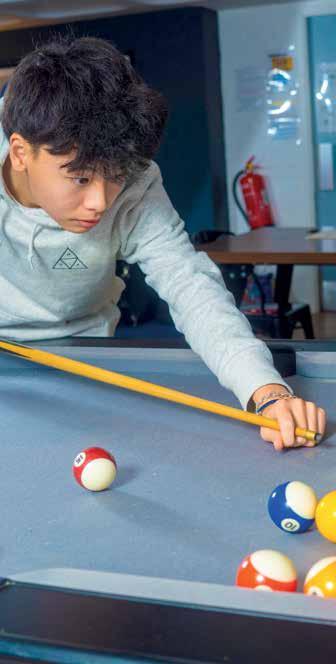
BOARDING OPTIONS
We offer various boarding options here at Sibford School with family and work life in mind:
Full boarding
Full time boarders live on site in the boarding house at Sibford School for seven nights a week during term time. The school is responsible for the pupil’s care and wellbeing 24 hours a day.
Full boarding fees include:
- Accommodation
- Laundry
- Help with travel arrangements
- Health care
- All meals during the week
- Weekend brunch and Sunday evening meal at weekends plus a food allowance and a supply of staple foods (milk, bread, fruit etc.)
Weekly boarding
This option works well for students who have a lengthy daily commute to Sibford School, but still want to travel back home at weekends. Students have the option to arrive on Sunday night or Monday morning and depart on Friday afternoon or Saturday morning.
Students can stay for one to five nights a week, meaning the school can work effectively around family life and work commitments.
Transport to and from Banbury train station is available on Monday mornings and Friday evenings.
Flexi- boarding
This boarding option means pupils can board for the occasional night if they wish. The cost includes 24-hour care, full board with meals and bed linen.
External students wishing to apply to Sibford Sixth Form for September 2025 entry should apply by Friday 7th February 2025. Please visit sibfordschool.co.uk/admissions to complete your Sixth Form application online.
Students moving into Sixth Form from Year 11 do not need to formally apply, instead submit their option choices to admissions@sibfordschool.co.uk by Friday 7th February 2025.
Scholarships are offered to Sixth Form students across two categories:
• Academic: where a student shows exceptional academic ability and potential.
• Talent: Art, Drama, Music, Sport.
All-Rounder scholarships may be awarded at the Head‘s discretion to candidates who show academic promise in more than one area.
To apply for a Year 12 scholarship, you will need to complete the scholarship application form and return it to the Sibford School admissions office, along with any evidence required to support the application.
Scholarship applications for pupils who have applied to join Sibford Sixth Form in September 2025, should be received by 7th February 2025
The application will be reviewed, and an email will be sent inviting successful candidates to attend a Sixth Form scholarship day week commencing 24th February 2025. Unsuccessful candidates will be notified at this stage.
For more information on scholarships and to download the scholarship application form, visit sibfordschool.co.uk
Sibford School is committed to helping more young people reach their potential and encouraging them to achieve their aspirations whatever these might be. We offer a limited number of meanstested bursaries which are made available to existing and prospective students from both Quaker and non-Quaker families. Bursaries are not dependent on particular academic or creative achievement. They are, however, subject to annual testing of parental means and may be varied upwards or downwards depending on parental circumstances.
An independent company, Bursary Administration Ltd (BAL) will review and assess the application and arrange to visit you. Depending on their assessment of your application, the Bursary Committee may propose an award against day fees only (but not on any extra charges).
New bursary applications for September 2025 close on Friday 31 January 2025. Applicants are required to complete and submit all forms to our admissions officer by this date in order to be considered.

Art
Biology
Chemistry
Computer Science
Design Technology: Product Design
Drama
Economics
English Literature
French
Further Mathematics
Geography
History
Mathematics
Music
Physics
Philosophy and Ethics
Sociology
Spanish
Textiles
BTEC Business
BTEC Creative Digital Media
Level 3 Certificate in Food Science and Nutrition
BTEC Music
CTEC Sport and Physical Activity
EAL Intensive English
GCSE English
GCSE Mathematics
IELTS Preparation
Level 3 Extended Project Qualification
Please note that courses are dependent on sufficient number of students wishing to study each subject.

Exam Board: OCR
ENTRY REQUIREMENT
GCSE Art Grade 5 / Textiles Grade 5 / DT Grade 5
The Fine Art endorsement is suitable for those students who wish to demonstrate specialisation in particular materials, media or processes to allow for an appropriate depth of study.
The Art, Craft and Design endorsement is suitable for those students who wish to combine specialisms. Students are expected to produce a range of 2D and/or 3D work to evidence study of at least two specialisms in each component. Final outcomes for each component may be in one or a number of specialisms.
Both courses foster independent learning and research skills in students, whilst providing them with a solid grounding in practical techniques. Students are encouraged to explore and refine their ideas, taking into account their own emerging style. Recording information through drawing or related means, forms the basis of these studies as well as critical and contextual studies.
Art students at Sibford Sixth Form benefit from having their own personal studio space in which they can work at any time throughout the day.
COMPONENT 01: PERSONAL INVESTIGATION
• Non exam assessment (internally assessed and externally moderated)
• 120 marks
• 60% of the total A Level
This component involves:
• A portfolio of practical work demonstrating personal response to a starting point.
• A related personal study (1000+ words).
COMPONENT 02: EXTERNALLY SET TASK
• An externally set project culminating in a 15 hour exam (internally assessed and externally moderated)
• 80 marks
• 40% of the total A Level
The exam board will provide learners with a choice of theme, briefs and stimuli.
Please note: this is a two year course.

Exam Board: Edexcel (Biology A Salters-Nuffield specification)
GCSE Biology Grade 6 or Combined Science grade 6
GCSE Mathematics Grade 6
GCSE English Language Grade 6
The above represent recommended grades. Each student will be considered on an individual basis.
This course teaches Biology using exciting and motivating concepts that draw on contemporary and cutting-edge developments in the biological sciences. These include the health risks of smoking and obesity; genetic counselling; global warming; GM crops; DNA fingerprinting; the spread of pathogens; the destruction of natural habitats; drug abuse in sport and recreational drug use.
Practical work is seen as an integral accompaniment to theory work and is undertaken as frequently as possible. Eighteen core practical’s throughout the course assess students’ competency and they will be awarded either a pass or fail for practical endorsement alongside their examination grade. Students undertake a field trip in the summer of Year 12 to carry out fieldwork, sampling methods and statistics critical to the subject. The Biology course provides the opportunity to develop many skills including research, communication and ICT. Students will also develop an appreciation of the social, moral and ethical complexities of the subject.
Biology A Level is a key choice for anyone wishing to pursue university degrees in biology, zoology, biochemistry, veterinary or animal science and medicine and has great value when applying for careers such as midwifery, nursing and conservation.
A LEVEL 9BN0 (2 YEARS)
Paper 1: The Natural Environment and Species Survival
• 2 hour exam
• 33.33% of total A Level
Topic 1: Lifestyle, health and risk
Topic 2: Genes and healh
Topic 3: Voice of the genome
Topic 4: Biodiversity and natural resources
Topic 5: On the wild side
Topic 6: Immunity, infection and forensics
Paper 2: Energy, Exercise and Coordination
• 2 hour exam
• 33.33% of total A Level
Questions on topics 1 - 4 plus
Topic 7: Run for your life
Topic 8: Grey matter
Paper 3: General and Practical Applications in Biology
• 2 hour exam
• 33.33% of the total A Level award
Questions from topics 1 - 8
A pre-released scientific article will underpin one exam question.
Practical Endorsment for Biology (No exam assessment) Pass/Fail
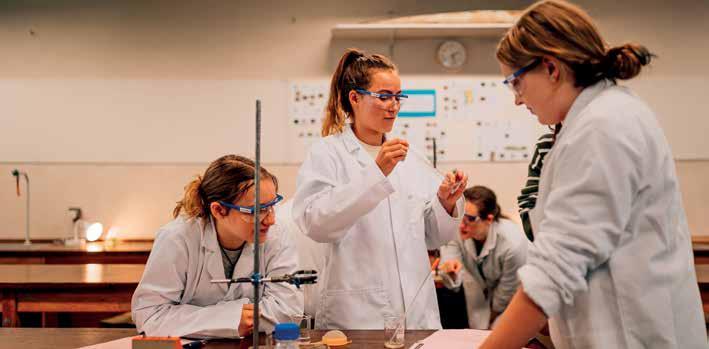
Exam Board: Edexcel
GCSE Chemistry or Combined Science grade 6 or above, GCSE Mathematics grade: 6 or above. The above represent recommended grades. Each student will be considered on an individual basis
As a science, Chemistry spans a number of disciplines, but at heart it is the science of materials. A Level chemistry students will learn a variety of topics drawn across the three main areas of Chemistry: inorganic, organic and physical. This means that students will learn how atomic and electronic structure decodes the thinking behind the periodic table, how pharmaceuticals can be made from simple organic molecules, and how reactions are manipulated to get the maximum amount of product in the shortest time.
This course suits students who enjoy thinking deeply and can focus in on the finer details as well as looking at the bigger picture of Chemistry in the wider world. It is a compulsory choice for anyone wishing to pursue medicine, dentistry and veterinary science, as well as chemistry-based degrees, such as pharmacy, pharmacology, and biochemistry.
Exam questions will test students’ knowledge and understanding of the relevant specification topics and experimental methods based on the core practicals in the specification.
• Paper 3 will also assess students’ knowledge and understanding of experimental methods, based on the core practicals in the specification.
• Question types: multiple choice, short and long answer questions (up to 6 marks), and calculations.
• Questions assessing students’ use of mathematical skills will make up 20% of the exam papers.
A LEVEL 9BN0 (2 YEARS)
Paper 1: Advanced Inorganic and Physical Chemistry
• 1 hour 45 minutes
• 90 marks 30% weighting
Paper 2: Advanced Organic and Physical Chemistry
• 1 hour 45 minutes
• 90 marks 30% weighting
Paper 3: General and Practical Principles in Chemistry
• 2 hours 30 minutes
• 120 marks 40% weighting
All topics across the full A Level specification. Half of the paper will focus on testing students’ knowledge and understanding of practical skills and techniques.
Students’ skills and technical competency when completing practical work is assessed by teachers. This forms the basis for the award of a Practical Endorsement at A Level. This is separate to the A Level grade and, if awarded, will be reported as a ‘Pass’ on A Level certificates for students who achieve it.
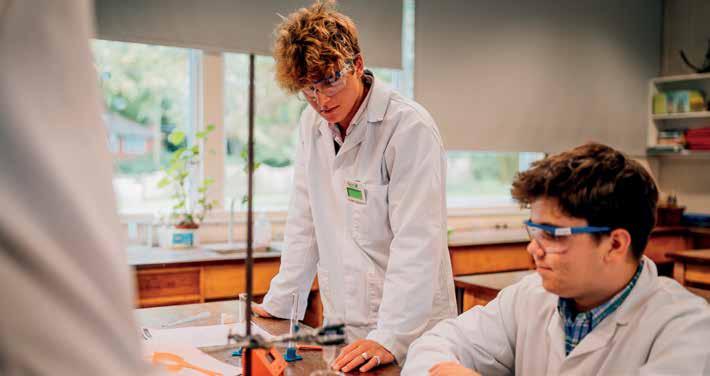
Grade 6 in GCSE Maths
Our A Level Computer Science qualification splits learning into three sections: computer systems, programming techniques and logical methods, and a programming project.
As natural progression from GCSE (9–1) Computer Science it provides the perfect springboard for students looking at specialising in a computing-based career. Within the course, students study a range of theory topics. These include the principles and understanding linked to programming, hardware and software, networks, systems development life cycles and implications of computer use. It enables teachers to tailor the qualification to match the requirements of students and has an open source ethos allowing you to use any programming language that meets the needs of the course.
You also have the reassurance that OCR is the market leader in Computer Science provision across the UK. This A Level will develop a student’s ability to:
- Think creatively, innovatively, analytically, logically and critically.
- Apply skills in and an understanding of computing (including programming) in a range of contexts to solve problems.
- Delve into producing graphical user interfaces and object-orientated programming solutions.
By completing a programming project, students will have the opportunity to create a substantial piece of software using modern design methods which they can use to display their skills and talents.
ASSESSMENT
A Level Computer Science is assessed through two written exams (each worth 40%) and a Programming Project (worth 20%). There is one re-sit opportunity for this subject.
IDEAL FOR STUDENTS WHO:
• Are looking to develop an advanced understanding of computer science.
• Want to apply their coding ability to solve real-world problems.
• Are looking at a computing orientated degree.
• Are aiming to work in the computing industry.
This school has an amazing learning environment that I have thrived in over my time at Sibford (Sixth Form Student)
CONTENT OVERVIEW
Component 01: Computer systems
Introduces students to the central processing unit (CPU), computer memory and storage, data representation, wired and wireless networks, network topologies, system security and system software. It also looks at ethical, legal, cultural and environmental concerns associated with computer science.
Component 02: Computational thinking, algorithms and programming
Students apply knowledge and understanding gained in component 01. They develop skills and understanding in computational thinking: algorithms, programming techniques, producing robust programs, computational logic and translators.
Practical programming
Students are to be given the opportunity to undertake a programming task(s) during their course of study which allows them to develop their skills to design, write, test and refine programs using a high-level programming language. Students will be assessed on these skills during the written examinations, in particular component 02 (section B).
Exam Board: AQA
ENTRY REQUIREMENT
Grade 5 in GCSE English and Maths
Grade 5 in GCSE Design and Technology is preferable. This is dependent on the student’s aptitude for the subject
Good sustainable design is vital to our world and our economy. Attractive styling attracts us to a product whilst graphic design is used to promote it through the medium of marketing. Although many people will say that the UK is no longer a manufacturing nation, nothing could be further from the truth. Many of the traditional ‘heavy’ industries may have gone, but there is still a strong demand for students in the design, engineering and construction industries. These industries need innovative people who are capable of developing material and manufacturing solutions for tomorrow’s problems.
Therefore, we offer our students extensive use of CAD (Computer Aided Design) and CAM (Computer Aided Manufacturing). We have our own virtual learning platform where the students can work on the latest versions of industrial standard software such as Solid Works, as well as two 3D printers, two CNC Routers, a CNC laser cutter and CNC vinyl plotter.
This course is aimed at students who enjoy problem solving, critical thinking and design products that solve real life situations. You will get the opportunity to critically analyse a range of products and examine how they were manufactured. This course provides you with a solid base from which to develop your design and making skills. The course will enable you to use the full range of materials to become designers and engineers of the future.
Component 1: Design and Technology in the 21st century Written examination: 3 hours / 50% of qualification.
You’ll take a single exam with a mix of structured and extended questions assessing your knowledge & understanding of:
• Technical principles
• Designing and making principles
• Your ability to analyse and evaluate wider issues in design and technology
Component 2: A sustained design and make project NEA: Approx. 80 hours/50% of qualification.
A sustained design and make project, based on a brief you’ve developed, assessing your ability to:
• identify, investigate and outline design possibilities · design and make prototypes
• analyse and evaluate design decisions and outcomes, including for prototypes made by you & others.
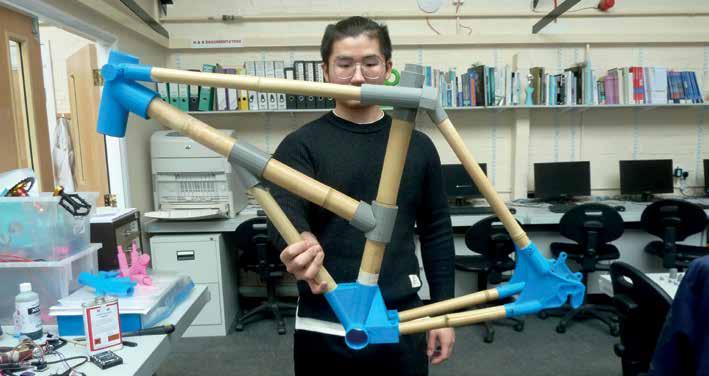
Exam Board: Eduqas
Grade 5 in GCSE English
GCSE Drama is not a requirement for students who want to take the A Level course. These students will be considered on an individual basis
This course is designed for students who enjoy reading, writing about and watching plays and taking part in Drama as a performer, director or designer. Students will get the opportunity to:
• Create, perform and respond to drama and theatre
• Develop the creativity and independence to become effective theatre makers
• Explore the relationship between theory and practice in a range of theatrical styles and periods and historical, social and cultural contexts
• Learn how relevant research, independent thought and analysis of live theatre production can inform decision making in your own practical work and put this understanding into practice
• Experience the ways in which theatre makers collaborate to create theatre
1. THEATRE WORKSHOP
• Non-exam assessment: internally assessed, externally moderated
• 20% of A Level
Students will be assessed on either acting or design. They must produce a realisation of the performance or design, and a creative log.
2. TEXT IN ACTION
• Non-exam assessment: externally assessed by a visiting examiner
• 40% of A Level
Students will be assessed on either acting or design. They must realise their performance live for the visiting examiner. Students choosing design must also give a 5-10 minute presentation of their design to the examiner.
3. TEXT IN PERFORMANCE
• Written examination: 2 hours 30 minutes
• 40% of A Level
Section A and B
Two questions, based on two different texts, one written pre 1956 and one written post-1956.
Pre-1956:
The Trojan Women, Euripides
As You Like It, William Shakespeare
Hedda Gabler, Henrik Ibsen
Machinal, Sophie Treadwell
Cat on a Hot Tin Roof, Tennessee Williams
Post-1956:
Saved, Edward Bond
Accidental Death of an Anarchist, Dario Fo Racing Demon, David Hare
Love and Information, Caryl Churchill
Chimerica, Lucy Kirkwood
Section C
A question based on a specified extract from: The Curious Incident of the Dog in the Night-Time, Mark Haddon.

Exam Board: AQA
GCSE English Grade 6
GCSE Maths Grade 6
It is not essential to have previously studied an Economics or Business course.
This course aims to develop an interest and enthusiasm for Economics by developing an understanding of the current economic issues, problems and institutions which affect everyday life. It will also explain, analyse and evaluate the strengths and weaknesses of the market economy, setting them both in a national and an international context. The course will help students to develop the knowledge of the key concepts which will enable them to understand and explain the issues involved. Students will therefore develop skills and attitudes which will equip them to face the challenges, opportunities and responsibilities of adult working life.
The course at A Level is divided into two parts:
1. Micro-Economics
Individuals, Businesses, Markets and Market failure
2. Macro-Economics
The National and International Economy.
Paper 1: Markets and Market Failure
• 2 hour written paper (including data response and essay questions)
• 80 Marks
• 33.33% of total A Level
A more detailed examination of the activities of businesses and market, with a review of the issues raised by inequalities of income and wealth.
Paper 2: National & International Economy
• 2 hour written paper (including data response and essay questions)
• 80 marks
• 33.33% of total A Level
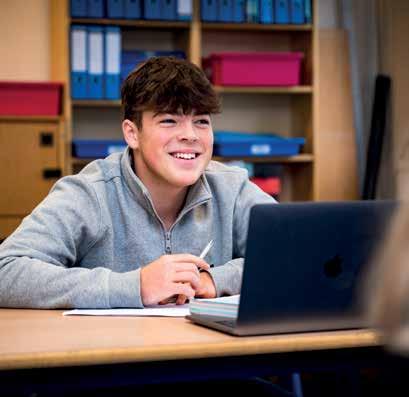
An in-depth study of the four macro-economic objectives and government policy, with an increased focus on the international context.
Paper 3: Economic Principles and Issues
• 2 hour written paper (including multiple choice and data response questions)
• 80 marks
• 33.33% of total A Level
An overview of issues raised in both Micro and Macro Economics.
A supportive environment where teachers push me to do my best, helping to prepare me for the future
(Sixth Form Student)
Exam Board: AQA B
GCSE English Grade 6
GCSE English Literature Grade 6 (if studied)
Grade 5 will be considered depending on circumstances
The A Level English Literature course is exciting and dynamic, introducing students to a range of challenging texts from the classics to contemporary fiction, in a variety of forms and genres.
Students enjoy engaging, lively discussions and thought-provoking reading assignments. The AQA course trains students to read critically and encourages the craft of academic writing. It offers new ways of looking at texts and particularly stresses links and comparisons between different works of literature.
This is an academic, rigorous course, which is an excellent introduction to the serious study of literature; it is also valuable preparation for further study in a variety of fields.
At A Level, students can develop their confidence when dealing with texts from different periods over different genres. The content of the AQA GCE offers a wide choice of set texts and places emphasis on genre and theory. The texts chosen inter-connect, influence and illuminate each other, encouraging independent study.
A LEVEL (2 YEARS)
Unit 1A: Aspects of Tragedy
• 2 hour 30 minute exam
• Closed book
• 75 marks
• 40% of A Level
Study of three texts: one Shakespeare; one drama; one further text (one of these being pre-1900).
Unit 2A: Elements of Crime Writing OR Elements of Political Writing
• 3 hour exam
• Open book
• 75 marks
• 40% of A Level
Study of three texts: one post-2000 prose; one poetry; one further text (one of these being pre-1900).
Critical Anthology
• Non-exam assessment
• 50 marks
• 20% of A Level
Two written essays, one on a poet and one on a prose text. These are analysed through areas in the Critical Anthology.
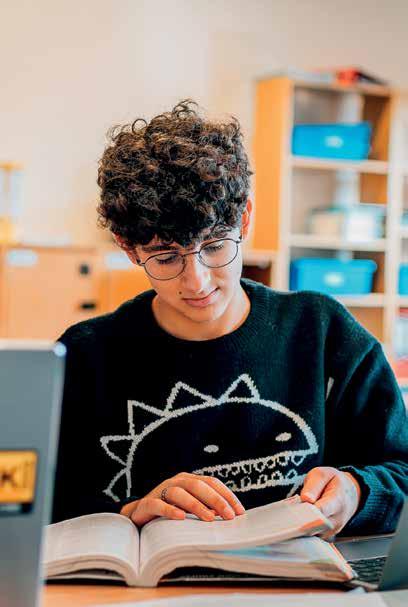
Exam Board: OCR
Grade 6 Geography (Grade 5 English and Maths GCSE is recommended)
Students without GCSE Geography will be considered, dependant on other grades
This specification is designed to highlight the main issues and concepts that young adults are likely to encounter in their current and future lives, so that they can make better informed decisions and be sensitive to a wide range of viewpoints and challenges.
The course covers a range of topical issues from human and physicals aspects of Geography. Geography A Level is well regarded by universities and employers due to the skill set that the course offers.
Fieldwork plays an important part in this subject. Our most recent field trip was a week in Dorset, investigating inequality in Weymouth and the study of coastal processes along the Jurassic Coast.
A LEVEL (H481)
EXAMINED AT THE END OF YEAR 13
Unit 01: Physical Systems
• 1 hour 30 minute exam
• 22% of the total A Level
Physical landscape
Earth’s Life Support Systems
Geography skills
Unit 02: Human Interactions
• 1 hour 30 minute exam
• 22% of the total A Level
Changing Spaces: Making Places
Global Connections - Human Rights and Migration
Geographical Skills
Students are able to study towards the AS Level at the end of Year 12.
Unit 03: Geographical Debates
• 2 hours 30 minute exam
• 36% of the total A Level (optionality – two of five to be studied)
1. Climate Change
2. Disease Dilemmas - current school option
3. Exploring Oceans
4. Future of Food
5. Hazardous Earth - current school option
Geographical Skills
Unit 04/05: Independent Investigation
• Non-exam assessment
• 20% of the total A Level
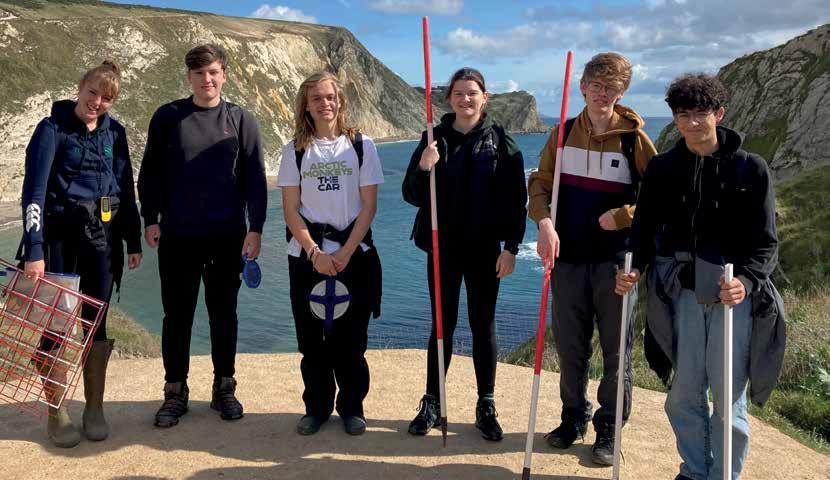
A Level History requires a passion for exploring and making judgements about the past. The course requires analytical skills, a willingness to take intellectual risks and an inquisitive mind. Lessons introduce students to a broad range of historical material to allow them to foster a sense of period across the course. Students are expected to read widely to build and broaden their knowledge and understanding of the course.
Component 1: Breadth Study
(1C: The Tudors, 1485 - 1603)
• 2 hour 30 minute exam
• 80 marks
• 40% of A Level
This option allows students to study, in breadth, issues of change, continuity, cause and consequence in this period through the following key questions:
• How effectively did the Tudors restore and develop the powers of the monarchy?
• In what ways and how effectively was England governed during this period?
• How did relations with foreign powers change and how was the succession secured?
• How did English society and economy change and with what effects?
• How far did intellectual and religious ideas change and develop and with what effects?
• How important was the role of key individuals and groups and how were they affected by developments?
In the exam, students are required to evaluate three different historical interpretations drawing on their own knowledge. In addition to this, they answer two essay questions from a choice of three.
Component 2: Depth Study (2N: Revolution and Dictatorship: Russia 1917 - 1953)
• 2 hour 30 minute exam
• 80 marks
• 40% of A Level
Students study the development and practice of communism in Russia. They explore concepts such as Marxism, Leninism, Stalinism, ideological control and dictatorship. This component also enables students to consider issues of political authority, the power of individuals and the inter-relationship of governmental and economic and social change.
In the exam, the students are required to evaluate the value of three historical sources and answer two essay questions from a choice of three.
Component 3: The advancement of the rights of African Americans, 1865-1968
• 20% of A Level
Students submit an essay of approximately 3,500 to 4,500 words which addresses the advancement of the rights of African Americans. This historical investigation provides students with an enhanced understanding of the nature and purpose of history as a discipline and how historians work. Students are required to demonstrate skills of historical analysis, evaluation, and judgement, to appraise the views of historians, and to evaluate primary sources. This is a fascinating area of study which still resonates in contemporary public discourse.
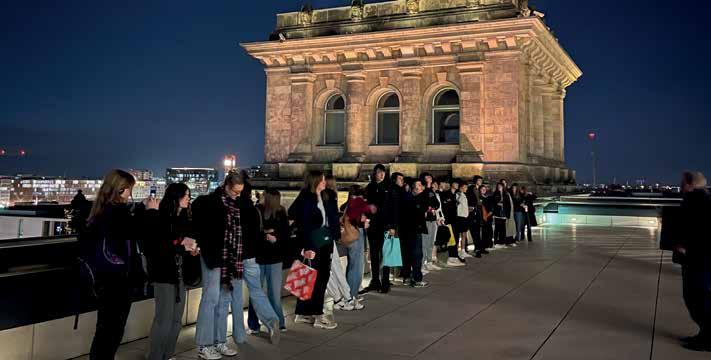
Exam Board: Edexcel
ENTRY REQUIREMENT
GCSE Mathematics Grade 6 (7 or higher is strongly recommended)
Through Mathematics, students develop their abilities in logical thinking, formulating problems, following a structured approach to solving them, making deductions and analysing complex situations. These skills are critical to success in many degree courses and careers so it is no wonder universities hold A Level Mathematics in high regard.
Whereas in the past there were options in terms of which modules could be studied, the entirety of the course is now compulsory and includes three main areas of study; Pure Mathematics, Mechanics and Statistics.
A LEVEL
• 3 equally weighted Exam papers, 2 Pure and 1 Applied (Statistics and Mechanics).
Pure Mathematics
We continue to study the main themes of algebra and geometry alongside introducing and exploring calculus, all with an emphasis on becoming more mathematically minded and rigorous in our approaches.
Statistics
Furthers students’ conceptual understanding of statistical methods, including applications of methods to large data sets.
Mechanics
More complex situations are modelled with the use of mathematics, enhancing students’ understanding of the physical applications of forces.
There may be an opportunity for students to sit an AS at the end of Year 12, but this will be decided on an individual basis.
I’ve had an incredible experience since joining Sibford School; the supportive community, engaging classes, and countless opportunities for personal growth make it a fantastic choice for anyone seeking an enriching education
(Sixth Form Student)
GCSE Mathematics Grade 7
You must also be studying A Level Mathematics
Further Mathematics is a full A Level, which adds to the breadth of topics covered and enhances the experience and understanding of the vast subject that is Mathematics. It consists of various module options and takes students beyond the Mathematics A Level syllabus to begin studying topics that are typically seen during the first year in university science or engineering courses. The possible course of study is outlined below.
A LEVEL
• 4 equally weighted exam papers.
Core Pure Mathematics 1 and 2
These are the only compulsory modules and enable students to study problems involving series, complex numbers, matrices, proof, polar coordinates, hyperbolic functions and differential equations.
There are then a number of options from which two must be studied. Options include but are not limited to:
Further Pure Mathematics
Students begin to study more complex problems involving numerical methods, conic sections, complex numbers, matrix algebra and proof, first order differential equations, second order differential equations, Maclaurin and Taylor series, vectors and calculus.
Mechanics
Add further complexity to the study of kinematics and dynamics. It introduces momentum, elastic collisions and the concepts of work, energy and power.
Decision Mathematics
This is the study of algorithms and involves being able to follow, as well as create, processes that enable tasks to be done more efficiently or by a computer. It involves the study of algorithms on graphs, the route inspection problem, critical path analysis and linear programming.
There may be an opportunity for students to sit an AS at the end of Year 12, but this will be decided on an individual basis.
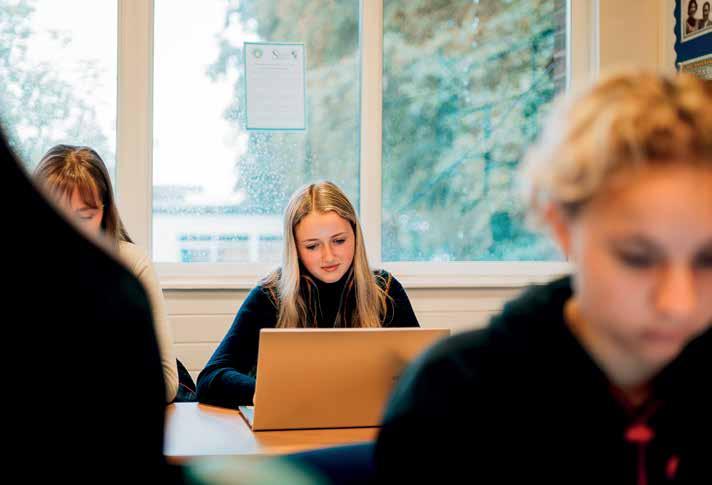
ENTRY REQUIREMENT
GCSE French/Spanish Grade 6 or above
Exam Board: AQA
The above represent recommended grades. Each student will be considered on an individual basis.
This specification is designed to be taken over one or two years. The course fosters a range of transferable skills including communication, critical thinking, research skills and creativity, which are valuable to the individual and society. The content is suitable for students who wish to progress to employment or further study, including a modern languages degree.
AS
The AS course is fully co-teachable with the first year of the A Level course, enabling flexibility for students as they plan their course of study.
Paper 1: Listening, reading and writing
• 1 hour 45 minute written exam
• 45% of the AS
Aspects of society: current trends
Artistic culture Grammar.
Paper 2: Writing
• 1 hour 30 minute written exam
• 25% of the AS
One text or one film from the lists in the specification. Grammar.
Paper 3: Speaking
• 12-14 minute oral exam
• 30% of the AS
One sub-theme from Aspects of society: current trends and one sub-theme from Artistic culture.
This specification has been designed to be studied over two years.This qualification is linear which means that students will sit all their exams at the end of the course.
Paper 1: Listening, reading and writing
• 2 hours 30 minute written exam
• 50% of the A Level
Aspects of society: current trends
Aspects of society: current issues
Artistic culture
Aspects of political life Grammar.
Paper 2: Writing
• 2 hour written exam
• 20% of the A Level
One text and one film or two texts from the list set in the specification. Grammar.
Paper 3: Speaking
• 21-23 minute (including 5 minutes preparation time) oral exam
• 30% of the A Level
Individual research project.
One of four sub-themes:
• Aspects of society: current trends
• Aspects of society: current issues
• Artistic culture
• Aspects of political life
Pupils display highly-developed study skills
(ISI, December 2021)
Exam Board: OCR
GCSE Music Grade 7 or above
Proficiency on at least one instrument (or voice) approximately Grade 6 Standard or above and a firm grasp of conventional musical notation; some ability on the piano is desirable
The above represent recommended grades. Each student will be considered on an individual basis
The OCR Advanced GCE specifications extend the musical skills of Performing, Composing and Appraising in ways that emphasise their interdependence. There is increased choice within the specification to focus on performance or composition.
There are no limits on the instruments (or voices) and types of repertoire which may be presented in performance and the study of the widest possible range of music, including folk, popular and classical traditions of non-Western origin as well as those of jazz and Western classical and popular traditions, is encouraged.
Both AS and A2 specifications offer scope to develop creativity using music technology and in non-Western traditions, as well as more traditional tonal and non-tonal Western composing skills.
Please note, there are two possible Music courses, A Level and BTEC. The A Level course is detailed here and the BTEC on page 44.
We will be offering just one of these courses, based on the most suitable qualification for the applicants.
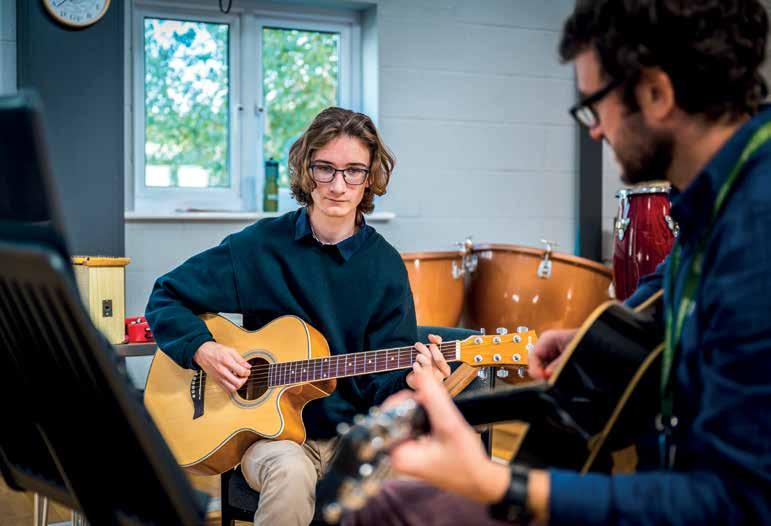
Exam Board: Edexcel
GCSE Physics or Combined Science Grade 7
GCSE Mathematics Grade 6
The above represent recommended grades. Each student will be considered on an individual basis.
This course combines theoretical study of Physics principles as well as the uses and applications of Physics. Topics such as mechanics, waves, materials and electricity are studied in the first year. In the second year, particle physics, further mechanics, electric and magnetic fields and cosmology are key topics. There are plenty of opportunities for practical work in the laboratory. It is recommended that students studying Physics also study A Level Mathematics, but it is not essential.
A LEVEL (2 YEAR)
Unit 1: 9PHO/01
• 1 hour 45 minute exam
• 90 marks
• 30% of total qualification
This unit involves the study of Mechanics
Electric circuits
Further mechanics
Electric and magnetic fields
Nuclear and particle physics
Unit 2: 9PHO/02
• 1 hour 45 minute exam
• 90 marks
• 30% of total qualification
This unit involves the study of Materials
Waves and particle nature of light
Thermodynamics
Space
Nuclear radiation
Gravitational fields
Oscillations.
Unit 3: 9PHO/03
• 2 hour 30 minute exam
• 120 marks
• 40% total qualification
The paper will include questions that assess conceptual and theoretical understanding of experimental methods (indirect practical skills) that will draw on students’ experiences of the core practicals.
Unit 4: 9PHO/04
Science Practical Endorsements
No exam assessment Pass/Fail
The school successfully meets its aim to provide pupils with a thirst for lifelong learning
(ISI,
December 2021)
Exam Board: Edexcel
GCSE English Grade 6
GCSE Religious Education / Religious Studies short or full course. Grade 6 is preferable but not essential.
This qualification is designed to nurture the development of critical and reflective thinking with the aim of developing a greater understanding and appreciation of religious beliefs and teachings, as well as the disciplines of ethics and philosophy of religion. Emphasis is placed on critical analysis and the construction of balanced, informed arguments within the context of a religious, philosophical and ethical awareness. This course aims to thoroughly engage learners and develop an interest in Religious Studies, which extends beyond the classroom and can be applied to the world around them.
This course aims to encourage learners to:
• develop interest in a rigorous study of religion and belief and relate it to the wider world
• develop knowledge and understanding appropriate to a specialist study of religion
• develop an understanding and appreciation of religious thought and its contribution to individuals, communities and societies
• adopt an enquiring, critical and reflective approach to the study of religion
The knowledge and skills that you will develop from studying this course would be particularly useful for careers in law, education, social work, politics, medicine, administration and the media. However, the subject material is also pertinent for your general personal development.
A LEVEL (9RS0)
Three components will be studied:
1. Philosophy of Religion
2. Religion and Ethics
3. Buddhism
Topics range from ancient influences on Religion Philosophy and Ethics to twentieth century perspectives.
Assessment is by three 2 hour written examinations covering all three components.
Pupils display strong academic and other achievements for the size of the school (ISI, December 2021)
Exam Board: AQA
There is no requirement to have studied Sociology before.
This qualification offers an engaging and effective introduction to Sociology. Students will learn the fundamentals of the subject and develop skills valued by higher education institutions and employers, including critical analysis, independent thinking and research.
Sociology is a social science which explores the causes and outcomes of social behaviour, societal change, the structure of society and the different groups within it. Through studying Sociology A Level, you will explore a range of fascinating topics such as families and households, education, and crime and deviance through the lens of socialisation, culture, power and identity. The impact of gender, class, age and ethnicity on these topics is also explored. Additionally, you will develop a thorough understanding of sociological research methodology and gain knowledge of quantitative and qualitative methods of research, with consideration of the associated practical and ethical issues involved in research.
A LEVEL (7192)
3.1.2
ASSESSMENT
Paper 1: Education with Theory and Methods
• 33% of A Level
• 40% of A Level
Paper 2: Topics in Sociology
• 33% of A Level
Paper 3: : Crime and Deviance with Theory and Methods
• 33% of A Level
Please note: this is a two year course, with exams being sat in the summer term of Year 13.
Exam Board: OCR
ENTRY REQUIREMENT
GCSE Textiles Grade 5 / Art Grade 5 / DT Grade 5
Textiles is a versatile and exciting subject at Sibford School. This course allows students to extend and develop their skills in a wide range of media. We encourage agility in thinking, and a courageous, creative capability with materials. Outcomes are considered for interior surfaces, stand-alone pieces, fashion and accessories. Students are encouraged to pursue their own particular interests, be that constructed or surface design textiles. They are encouraged to explore and refine their ideas considering their own emerging personal style. Recording information, through drawing or related means, forms the basis of these studies.
The course fosters independent learning and research skills in students, whilst providing them with a solid grounding in practical techniques. Critical and contextual studies are fundamental. Sixth Form Textiles students benefit from having their own personal studio space in which they can work at any time throughout the day.
COMPONENT 01: PERSONAL INVESTIGATION
Non exam assessment (internally assessed and externally moderated)
• 120 marks
• 60% of the total A Level
This component involves:
A portfolio of practical work demonstrating personal response to a starting point.
A related personal study (1000+ words).
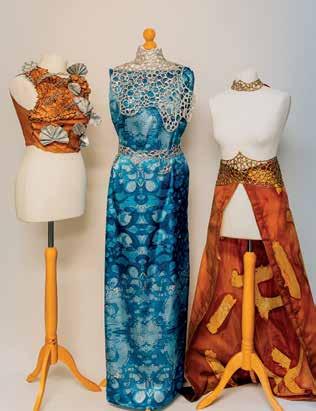
COMPONENT 02: EXTERNALLY SET TASK
An externally set project culminating in a 15 hour exam (internally assessed and externally moderated)
• 80 marks
• 40% of the total A Level
The exam board will provide learners with a choice of theme, briefs and stimuli.
Please note: this is a two year course.
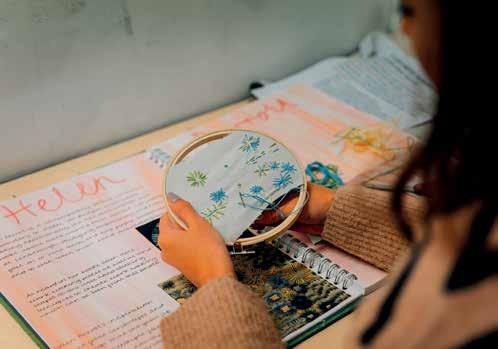
Sibford School offers Level 3 vocational qualifications in the following subjects:
• BTEC Business
• BTEC Creative Digital Media Production
• Level 3 Certificate in Food Science and Nutrition
• BTEC Music
• CTEC Sport and Physical Activity
Vocational Grading
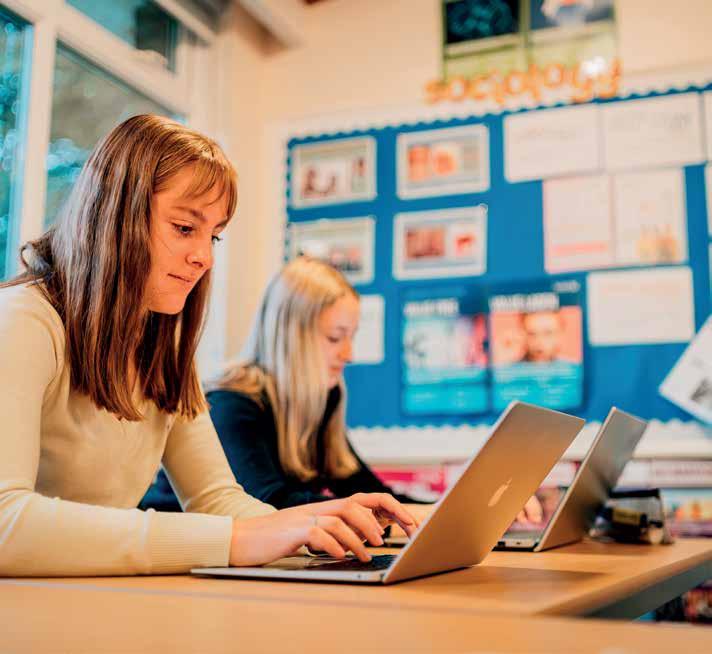
Pupils’ display advanced moral development, their appreciation of diversity and equal treatment is excellent
(ISI, December 2021)
Exam Board: Edexcel Equivalent to one A Level
Grade 5 in GCSE Maths and English, and in Business if taken, although it is not essential to have previously studied a Business course.
The BTEC Business programme, Level 3 Extended Certificate, offers the students the opportunity to develop their understanding of the ‘real’ business world through; focused research and independent study. Students are expected to commit to the course through organising their time effectively to meet strict deadlines for coursework projects and embrace practical application of business theories and models to real business examples.
Students will prepare for two external examinations in Year 12 based on specific areas of business: Marketing campaigns and Personal and Business Finance. In Year 13 the final units are coursework and practical. Students will investigate real businesses and make comparisons of why and how successful they are, based on a variety of business models and theories. Additionally, students will undertake roles as an interviewee and interviewer to build and develop their understanding of the recruitment and selection process. This prepares students for applications to Higher Education, Apprenticeships, or the world of work.
The course structure is as follows:
Unit 2 Design a Marketing Campaign 90 GLH (Examinable)
In this unit you will:
A. Demonstrate knowledge and understanding of marketing principles, concepts, processes, key terms, data sources and definitions.
B. Analyse marketing information and data, demonstrating the ability to interpret the potential impact and influence on marketing campaigns.
C. Evaluate evidence to make informed judgements about how a marketing campaign should be planned, developed and adapted in light of changing circumstances.
D. Be able to develop a marketing campaign with appropriate justification, synthesising ideas and evidence from several sources to support arguments.
In this unit you will:
A. Demonstrate knowledge and understanding of business and personal finance principles, concepts, key terms, functions and theories.
B. Apply knowledge and understanding of financial issues and accounting processes to real-life business and personal scenarios.
C. Analyse business and personal financial information and data, demonstrating the ability to interpret the potential impact and outcome in context.
D. Evaluate how financial information and data can be used, and interrelate, in order to justify conclusions related to business and personal finance.
In this unit you will:
A. Explore the features of different businesses and analyse what makes them successful.
B. Investigate how businesses are organised.
C. Examine the environment in which businesses operate.
D. Examine business markets.
E. Investigate the role and contribution of innovation and enterprise to business success.
In this unit you will:
A. Examine how effective recruitment and selection contribute to business success.
B. Undertake a recruitment activity to demonstrate the processes leading to a successful job offer.
C. Reflect on the recruitment and selection process and your individual performance.
This is a fantastic course which takes a closer look at the food we eat every day. Students will be cooking every week, alongside reinforcing the learning with theoretical knowledge in a classroom environment. By the end of this course you will have a sound knowledge of the science behind the food we eat, understanding chemical compositions of food along with a fantastic practical skill set.
COURSE CONTENT
YEAR 12
Unit 1 – Meeting Nutritional needs of Specific Groups
• 50% controlled assessment which requires you to plan and cook a three course meal for 2 people
• 50% written exam worth 90 marks
YEAR 13
Unit 2 – Ensuring Food is Safe to Eat
Why should we follow storage recommendations on food products? Why do menus need to highlight products containing nuts? Why should vegetarian dishes be prepared away from those containing meat? Why are temperature probes used in the food industry?
Unit 3 - Experimenting to Solve Food Production Problems
Why does ice cream freeze? How do I stop cream curdling? How do I make cakes rise? Why do salad dressings separate?
CAREER PATHWAYS
Studying Food Science and Nutrition open doors to many pathways:
• Studying ‘Food Science’ at University
• Working directly in a kitchen
• New product development roles
• Product evaluation roles

Exam Board: Pearson Equivalent to one A Level
GCSE Grade 4 in Maths and Grade 5 in English. Students will also benefit from having an interest in film and television production. Candidates’ applications will be considered on an individual basis
The qualification provides a coherent introduction to the study of creative digital media production at this level. Learners develop an understanding of media industries through analysing media representations alongside pitching and producing their own media projects.
It is designed for post-16 learners who aim to progress to higher education and ultimately to employment, as part of a programme of study alongside other BTEC Nationals or A Levels.
This course will suit students who are positive and self-motivated and who can manage their time effectively. The course is taught through a combination of formal teaching and independent research and investigation.
Note:
External assessments take place in January and May of each academic year. Assessment can be sat in either year of the course delivery. Currently pupils sit Unit 1 external assessment in January of their first year and Unit 8 in January of the second year.
Learners must complete the 2 year course in order to obtain certification.
CANDIDATES COMPLETE 4 UNITS IN TOTAL AS OUTLINED BELOW
Unit 1: Media Representations Exam. 2 hours. External
Unit 8: Responding to a commission Exam. 5 hours. External
Unit 4: Pre-production portfolio Internal
Unit 10: Film production (Fiction) Internal
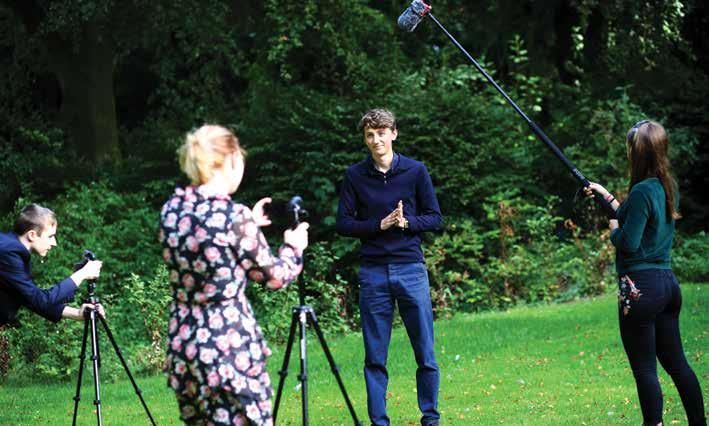
National Diploma / Certificate in Music Exam Board: Pearson Equivalent to one A Level
GCSE Music Grade 4
Proficiency on at least one instrument (or voice)
The above represent recommended grades. Each student will be considered on an individual basis
The course enables students to develop practical skills, knowledge and understanding relevant to the music industry. There are many performance, recording and creative opportunities in addition to a timetable of classroom based learning.
THE COURSE IS EQUIVALENT TO ONE A LEVEL
All students undertake three mandatory units:
• Ensemble performance techniques
• Professional practice in the music industry
• Creating a music product
• Pupil’s own choice of a specific area of interest
Please note: both of the Music A Level and Music BTEC Level 3 are two year courses.
Please note, there are two possible Music courses, A Level and BTEC. The BTEC is detailed here and the A Level course on page 35.
We will be offering just one of these courses, based on the most suitable qualification for the applicants.
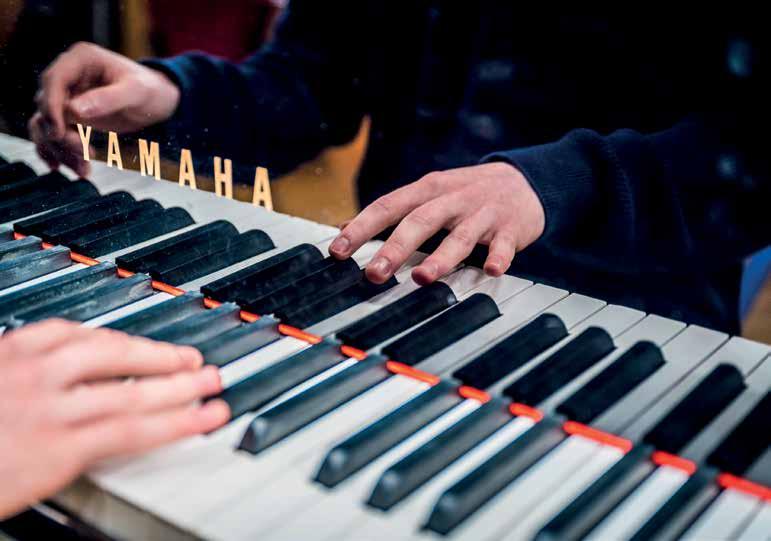
Grade 4 in GCSE English and Maths
Exam Board: OCR
Equivalent to one A Level
This qualification is not just about being able to play sport, it will provide learners with the skills, knowledge and understanding to progress into higher education on a sport-related programme such as sport & physical education, sport science, sport coaching and development or sport and leisure management.
Learners will take between five and six units made up of mandatory and optional units:
Everybody will study the following mandatory units:
• Body systems and the effects of physical activity
• Sports coaching and activity leadership
• Sports organisation and development.
These units will give learners an understanding of sport in the wider contexts of coaching and leadership, anatomy and physiology, the body’s short and long-term responses to physical activity and the framework of sport in the UK and the organisations involved. Learners will also develop transferable skills such as planning, communication, adaptability and leadership.
Every unit must be passed for learners to be awarded the qualification. Qualifications are graded using a Pass, Merit, Distinction and Distinction*.
COURSE CONTENT
Certificate (180 GLH): Year 1
Unit 1 Mandatory (90 GLH): Body systems and the effects of physical activity.
• 1 hour 30 minutes written paper.
Unit 2 Mandatory (90 GLH):
Sports coaching and activity leadership
Internally assessed through coursework assignments and externally moderated.
Extended Certificate (360 GLH): Year 2
• 1 hour 30 minutes written paper.
Unit 5 (60 GLH):
Performance analysis in sport and activity Internally assessed through coursework assignments and externally moderated.
Unit 19 (60GLH):
Sport and Exercise Psychology
Internally assessed through coursework assignments and externally moderated.
The Extended Certificate includes units already studied in Year 1 and Units 5 and 6 may vary depending on which optional units have been selected to study.
Pupils demonstrate excellent self-confidence and self-understanding
(ISI, December 2021)
(for speakers of other languages)
ENTRY REQUIREMENT
You will have completed Year 10 and 11 at Sibford School or enter the Sixth Form with an IELTS score of at least 5.5 or have an equivalent Upper Intermediate level.
Note: For those who need further English language before progressing to A Levels we also offer an Intensive English Course. Please ask for a copy of our EAL brochure
The English Language Advancement and IELTS Preparation Course is offered as a full subject option for all Year 12 and 13 overseas students. It will help you to advance your general language skills while also providing specialist preparation for the IELTS (International English Language Testing System) exam.
You will study Upper Intermediate English grammar, vocabulary and language skills and will also spend time reading, writing, speaking and listening.
You will also receive support with exam techniques and selfcorrection techniques and undertake regular practice exams.
ASSESSMENT
The exam consists of four sections:
• speaking
listening
reading
writing

(worth more than 50% of an A Level)
ENTRY REQUIREMENT
GCSE English Grade 5
GCSE Maths Grade 5
Exam Board: OCR
This course provides an exciting and challenging opportunity for students to work on a project of their own choice under the guidance of a supervisor. This involves applying organisational skills and strategies to meet your stated objectives.
Your supervisor will work with you to guide and facilitate your learning and to deliver taught skills such as project management, time management, research and presentation skills.
Throughout the project you will have regular tutorials and review meetings with your supervisor and record all aspects of your work in a project log. The format of the project will either be a 5,000 word report or an artefact such as a video, performance, CD, script, exhibition plus a 1,000 word report.
ASSESSMENT
• No formal examinations
• The project is centre marked and externally moderated
Assessment falls into 4 key areas:
1. Planning and managing
2. Research and use of resources
3. Development and realisation of project
4. Evaluation
Everything you need to know about the EPQ
By Annabel Heseltine, editor of School House Magazine
“The EPQ can be thought of like a mini thesis. It presents pupils with a chance to pursue a topic of study which is totally of their own choosing and unconstrained by an exam syllabus.
“There are a number of factors that have led to its popularity in recent years. In the first instance, there can be little doubt that the desire to secure places at a leading Russell Group university is the key factor that motivates pupils to pursue it as a course of study. With fierce competition for places at the best universities, the EPQ is becoming one way in which pupils can stand out from the crowd.
“The EPQ also allows pupils to do something totally different and outside of the mainstream of their in-class subject choices. It gives pupils an opportunity to explore fields of study not open to them in the usual A Level subject choices.”
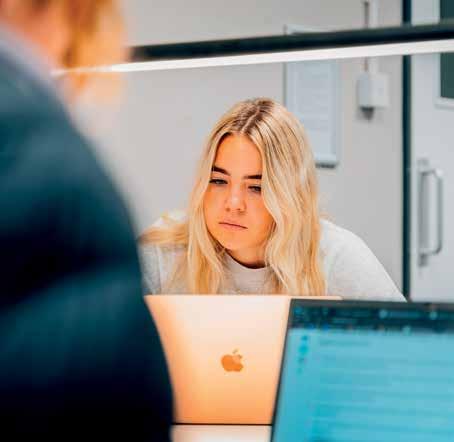

















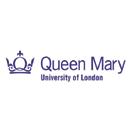


WE ARE PROUD THAT OUR LEAVERS GO ON TO STUDY A WIDE RANGE OF INTERESTING COURSES ALL OVER THE COUNTRY, INCLUDING:
Materials science and Engineering Strategy, Intelligence and Security Animation Music Production Fashion History & Theory Creative Media Technology Art Direction Rural Land Management Journalism
School leavers, including the most able, are successful in gaining places at education and employment destinations of their choice (ISI, December 2021)
Sibford School
Telephone: +44 (0)1295 781200 For admissions enquiries: admissions@sibfordschool.co.uk